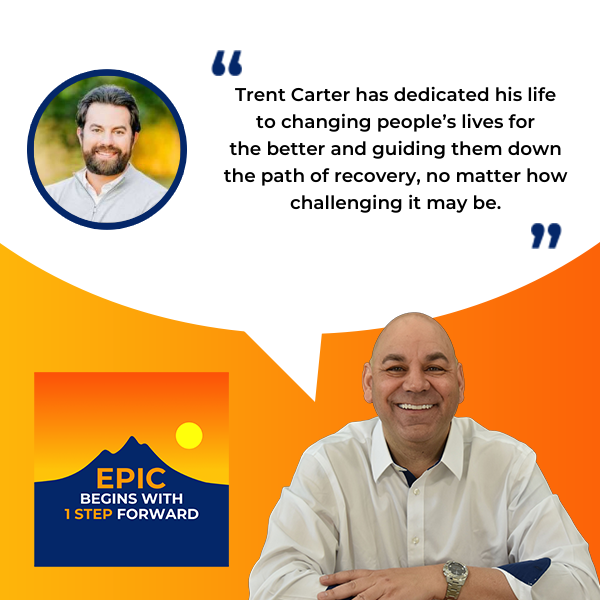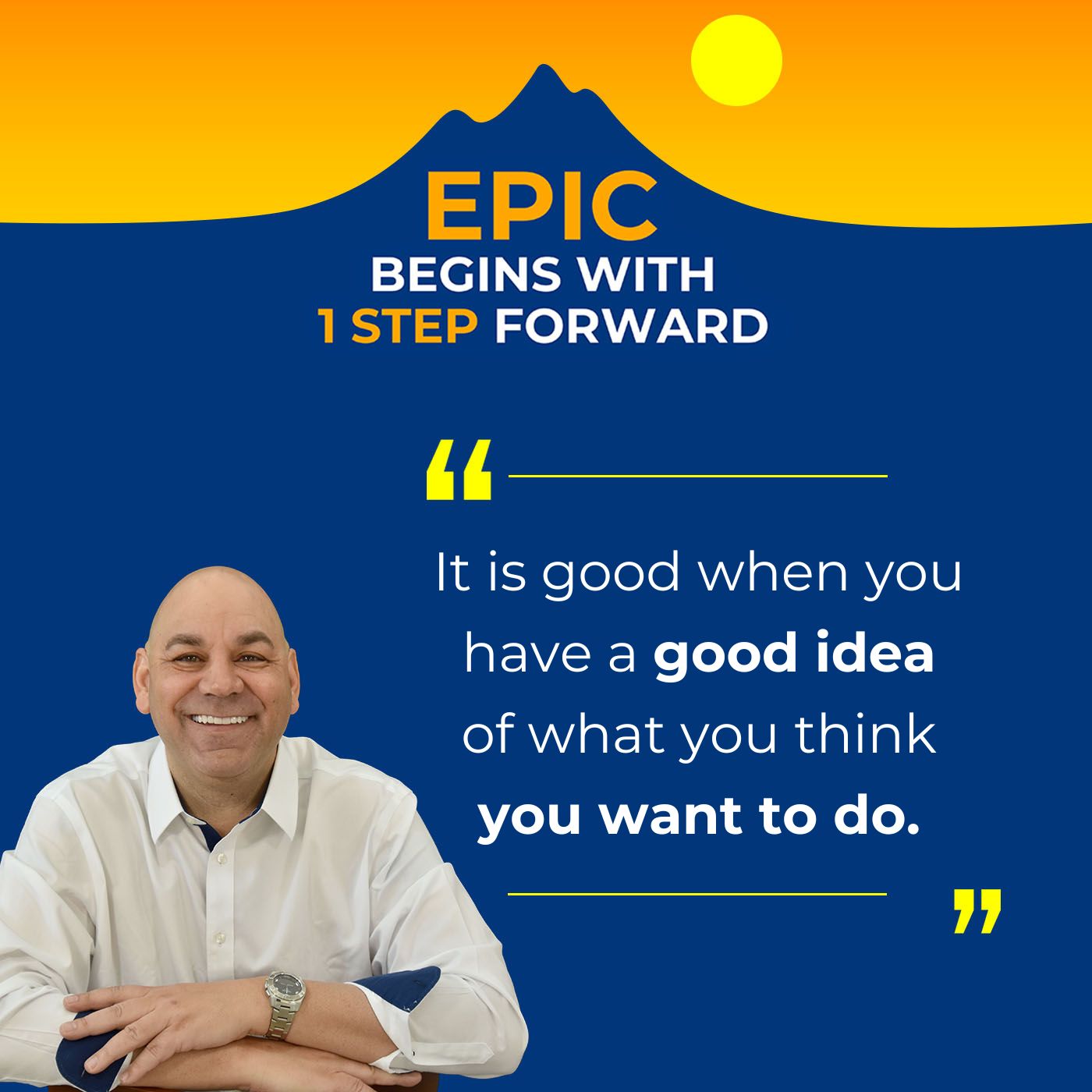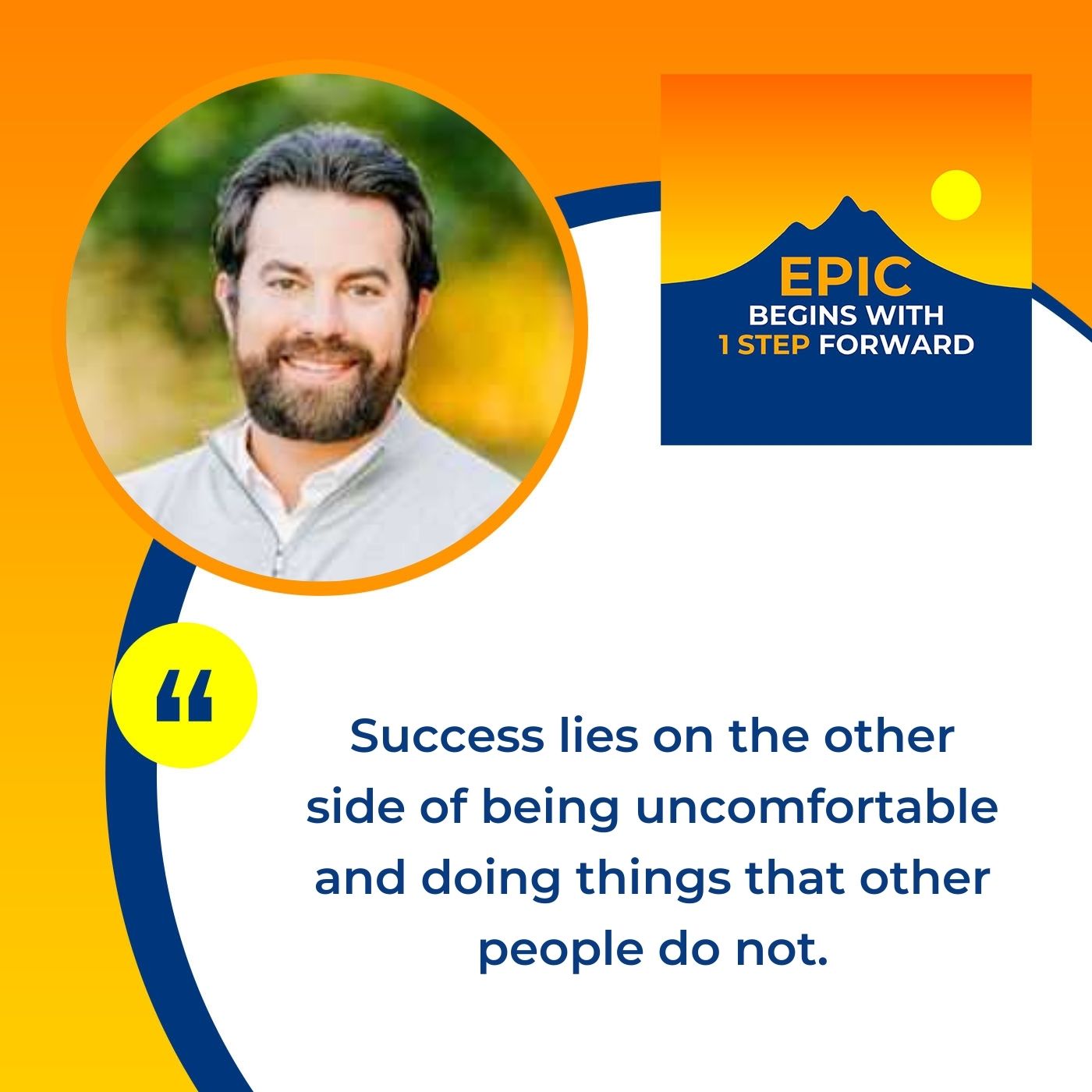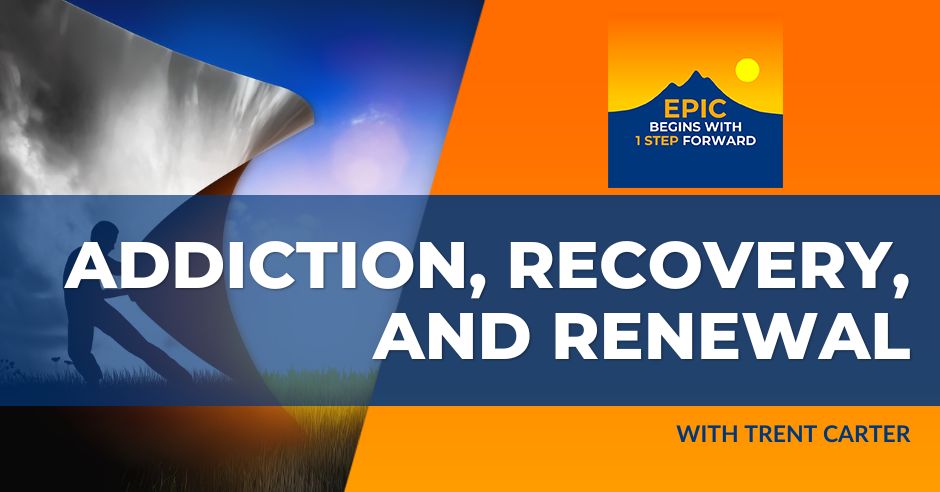In this powerful episode of EPIC Begins With 1 Step Forward, Zander Sprague speaks with Trent Carter, board-certified nurse practitioner, addiction medicine specialist, and founder of Renew Health in New Mexico. Trent shares how his passion for helping others led him to build a network of clinics dedicated to treating substance use and co-occurring mental health disorders in some of the most underserved communities. From confronting New Mexico’s fentanyl crisis to carrying Narcan in his car, Trent’s commitment to saving lives is personal and relentless. They also explore his new book, The Recovery Tool Belt, and how small steps of hope can lead to life-changing transformation. This episode is packed with inspiration, insight, and a message of renewal for anyone embarking on their own EPIC journey.
Free E-book
https://dl.bookfunnel.com/afk096okro
Apply to be a Guest on My TV show
https://www.epicchoicemedia.com
#EPICBeginswith1StepForward, #ZanderSprague, #NewMexico, #PsilocybinTreatments, #AddictionRecovery
—
Watch the episode here
Listen to the podcast here
Addiction, Recovery, And Renewal: Trent Carter’s Mission In New Mexico
Changing People’s Lives In New Mexico
I am honored to be joined by Trent Carter. Trent, tell us who you are and what you do.
Thank you so much for having me on. I’m excited for this. I’m Trent Carter. I’m a Board Certified Nurse Practitioner. I’m Board Certified in Addiction Medicine as well. I am the CEO and Founder of Renew Health here in New Mexico. What started as a single outpatient clinic to help folks who are struggling with addiction, substance abuse, and mental health has grown. Now we have multiple locations and we serve the entire state. I’m very proud to say that we have helped change and save thousands of lives at this point. I’m also a published author. I released The Recovery Tool Belt.
Congratulations.
Thank you.
This is going to be a fascinating conversation. The work that you’re doing is epic and much needed, especially in New Mexico. You and I were talking before we came on about some of the challenges in New Mexico, like lack of mental healthcare, lack of medical help, and stuff. Your path to becoming an addiction recovery specialist, how did you get there? I get the nurse practitioner part. That makes sense, but addiction recovery.

It’s a hard question to answer because I’ve never struggled myself. I never personally struggled with addiction. I don’t have anyone close to me, a close friend, a family member, or a loved one who has ever struggled. I just have a passion for it. As a nurse, before becoming a nurse practitioner, when I was working as an RN, I would see it some. I worked primarily in a hospital setting. I would see it there, but I worked trauma. I was ICU, so we didn’t ever manage it, but I would see folks who were struggling with it.
Where I started to take an interest was when I went back to school to become a nurse practitioner. I was in school. I was doing clinical rotations at a private practice. It’s like a family practice. He had a handful of patients that he was treating for opioid addiction, opioid abuse. That’s where I first got exposed to it. To see the drastic change, the life transformation, how quickly that could happen, and how appreciative these patients were, it was fascinating to me. I latched on. Still, at that point, I did not know I was going to go into this. That was in Texas.
My wife and my family moved to New Mexico, and I saw the need here. I started looking into what the resources are. Very limited. The overdose rates and addiction rates are astronomical, amongst the highest in the nation here in New Mexico. I decided I could do something about this, so we opened Renew Health.
For the treatments that you do, is it primarily substance addiction? Is it also gambling addiction, stuff like that, or is it mainly substance?
We focus on substance, not so much the behavioral side. If you’re ambling and eating, we don’t do that. There are substances like opioids, stimulants, alcohol, and things like that. Even helping folks with marijuana. The mental health side, too, because so commonly, they’re co-occurring. You’ve got someone who is using heroin, but their anxiety, their ADHD, and their depression are through the roof. We help with all that. We help through detox and everything.
We see it in the news all the time. Is New Mexico experiencing a tsunami of fentanyl, overdoses, and addictions?
Absolutely. Think about where we’re located. El Paso is just right there. It’s beneath New Mexico. They come through El Paso, then they hit that highway and go straight up to Albuquerque, and you’ve got two massive intersecting highways in Albuquerque, and that’s where it gets kicked out to the rest of the nation for a lot of it. The second it comes into America, in El Paso, Texas, within twenty minutes, you’re in New Mexico. You’ve got to go all the way through New Mexico to then kick it out. Yes, it’s a massive concern. The addiction rates, the overdose rates are high here in this state.
Do you walk around with Narcan? At least in California, we can buy it. You can go and get it, just to have it. I know some other mental health providers who work with people or with challenged communities and stuff. A friend of mine was like, “I have Narcan on me because if I come upon someone, I can give them a shot of Narcan and perhaps save their life.”
You’re exactly right. We stock Narcan at every facility. I personally have Narcan in each of my vehicles. I also carry Narcan in my business bag. Whenever I’m out moving around and traveling, I’ve got one. I’ve never had to use it, but if it does come down to that point, I’ve got one either on me or right outside in my vehicle.
That’s good. Trying to treat people who have substance use, but you yourself haven’t experienced that, is there a challenge there? Oftentimes, people who become addiction recovery specialists and are doing it are themselves recovering.
There’s a level of connection and understanding because they’ve walked that path.
There is a level of connection and understanding between recovered addicts and recovering addicts because they have walked the same path.
I do know what I’m talking about. Not that you don’t, Trent, but you understand what I’m saying. It’s the same thing with if you’ve run a marathon or you’ve done something, you’re like, “I’ve hiked the Grand Canyon.” You can talk about it. You’re like, “Yes, I’ve done that,” versus, “I did a lot of study about hiking the Grand Canyon. I can talk about it expertly.”
There’s a difference in real-world and living it versus looking at it in a book. Absolutely, I’ve encountered this. I’ve had patients who had legitimate concerns. I will say it’s not the norm. Most of my patients are happy to have treatment from someone who seems to care and seems to know what they’re talking about. I can think of a few instances where patients were like, “I don’t know, man. You haven’t lived what I’ve lived.” My answer is, “You’re right, I haven’t, but I’ve had conversations with thousands of patients. I’ve helped thousands of patients successfully from all different walks of life that probably have walked through exactly what you’ve walked through, if not very similar, probably even worse. I’ve lived that.”
That’s what I have to offer. Even though I haven’t personally struggled with it myself, what you’ve got here is someone who has devoted their life to it. This is why I’ve chosen to specialize in this. I’ve started a company and a clinic, and everything else. Now I have full staffing around the state, specifically for this. You’ve got somebody who’s pretty invested in trying to help you out.
What do you like best about your job there?
Changing somebody’s life. It’s great to save lives, too, but it’s the success stories. Unfortunately, we do not have a 100% success rate. Nobody has. We’re pretty good at what we do, and we’ve got a lot of success stories. Someone comes walking in on that first visit, and they don’t want to be here at all. I don’t mean just in the clinic. I’m talking alive. They may be suicidal, they’re severely depressed, and maybe they’ve tried treatment and it has failed before, whatever the case may be.
Their wife has left them, their kids told them, “Get away from me. I don’t want you around,” whatever. They come in, tears in their eyes, shoulders are slumped forward. They’re looking down, won’t even hardly make eye contact, and then you get a week or two later, and all of a sudden, you see a smile and you see eye contact, and you can see a different energy altogether from that person. It’s incredibly rewarding.
You fast-forward a couple of months, or it may take a couple of years. Oftentimes, these bridges get burned pretty badly. Whenever that spouse does come back into their life, or those children do come back into their life, or they are proud to say, “I bought my first vehicle. It’s fifteen years old, but it’s my first vehicle. I’m proud of that.” It’s incredible.
For those who don’t necessarily know, I’ve studied some about addiction when I was in graduate school and know a little about it. You obviously are an expert, but oftentimes, people will have to enter recovery multiple times before they find long-term success. Is that an accurate statement?
Absolutely. I view it as part of the journey. Plenty of folks do it on their first time. Let’s just say that’s not the norm.
Delving Into The Beautiful State Of New Mexico
I’ve heard that from recovering addicts. They said, “I was in 3, 4, or 6 times.” Sometimes they go five years sober and then something happens and they find themselves back at day one. Let’s talk a little about New Mexico, because it is a beautiful state, but there are challenges. If you’ve never been to New Mexico, folks, I went there. It is beautiful, but there is a lot of open wide space, little towns, and cities, but they’re spread out. Getting healthcare, getting mental healthcare, and finding jobs are challenging. You don’t live in a big city, is that correct?
I live in a small town. I think we have about 8,000 residents. It is a tourist location. Summertime and wintertime are our peak times. We have a lot of Texans coming through. Our population goes up temporarily there, but I think we’re around 8,000 permanent residents here. You’re exactly right. New Mexico does have a lot of inherent challenges because of its geography. It is so vast. By far, the majority of New Mexico is rural.
If you get outside of the Albuquerque metro area, then our next largest area would be Las Cruces. I don’t know the exact percentages, but they hold the majority of the population of the entire state right there in those two cities. All the rest, let’s say Roswell and the surrounding areas, you’ve got around 50,000 people. Once you get out of that and you have these little bitty towns, that’s a couple of thousand people. That’s going to be how the majority of New Mexico is.
Los Alamos has a decent population, I believe.
Yeah. Up there in that Santa Fe, Los Alamos, and Albuquerque area, I’m going to take a stab at it, but I’ll bet that in that general vicinity right there, it’s probably half the population of the entire state, all within 30 miles or 50 miles. When you talk about resources or even trying to get a job somewhere, trying to get a good job that has potential growth and scalability, it can be challenging. That’s the way that New Mexico is.
That’s one of the things that we at Renew Health are trying to change. I focus on the rural, underserved areas as opposed to opening a clinic in Albuquerque. I don’t have a clinic in Albuquerque because there are several up there. If you look at Silver City, New Mexico, which nobody has ever heard of, there’s a pretty big drug problem there. That’s where I want to make my impact.
If I’m correct, there’s also a fairly large native American population, well documented that sadly, there are a lot of substance use addiction problems. Does that make up a majority of your clients or not so much?
I definitely have patients who are natives that live on the reservation, but it is not the majority by any means. It has proven somewhat of a challenge to get in to say, “I want to be a resource for this reservation for where you are.” Our patients have sought us out, as opposed to the other way around. An initiative is what I call it. It’s something that we’re actively working on, as well as veterans. I want to do something good for veterans, and then we’re trying to get in with these detention centers and the jails around the state as well. Those are different initiatives that we have that we’re actively working on at Renew Health.
I’ve got to ask this question because lots of people are like, “New Mexico,” and they think of Breaking Bad. In terms of portraying New Mexico, how good a job do you think they did?
It’s Hollywood, so let’s not forget that. They did a fair job, for sure. There’s the whole thing, I forget what episode it is, but they threw the pizza on the house. There was a huge problem for those people because folks kept coming by and wanted to take pictures, and then they wanted to throw a pizza on and try to be funny and get a video. That’s very real. I think those people have since moved.
I saw a news story. They were selling the house, and the person living there was understandably fed up with people. They had gates around the whole place so people wouldn’t come up and knock on the door and stuff. I guess my question was outside of Walter White’s house, of what we saw of New Mexico, filming around Albuquerque, filming around outside in Las Cruces, and stuff, fairly accurate in terms of how it looks.
Absolutely. There are parts of New Mexico that are ugly because it’s desert, and there’s not a whole lot there. There are parts of New Mexico, I would say the majority is absolutely stunning, with massive mountains, incredible formations. I’ll say that these sunrises and sunsets here are amongst the prettiest I’ve ever seen. It’s simply fascinating here in New Mexico.
What Attracted Trent To Nursing And Medicine
I love to explore people’s epic journeys, and you clearly are on an epic journey. I’m reading your bio. You went and got your Nursing degree, I believe, and then you went on and got your nurse practitioner, but what attracted you to get into medicine?

I’ve always been into science. I’ve always been into the human body. Growing up, I idolized people like Arnold Schwarzenegger and Ronnie Coleman, and the fitness industry. They could shape their body the way that they wanted to. From a young age, I found that pretty fascinating. That’s what got me onto my health and fitness journey personally.
The human body, coupled with an interest in science, somehow equated to nursing for me. I don’t know exactly why. I know that in high school, I was one of those kids who graduated high school, and I knew what I wanted to do going into college, which seems to be a little more uncommon these days. It’s like, “I want to go to nursing school. I think I want to do more than nursing, but for right now, this is where I am going to get started.”
I went to Texas Tech in, in Lubbock, Texas. I got my degree there in Nursing. That’s what led to it. There’s also this component of you’ve got to want to care for people. You’ve got to have some compassion. You’ve got to be able to empathize with people. You’ve got to want to make them feel better, whatever that may be. There’s the component there too, because science and body, there are a lot of things you could do with it.
It’s almost like giving back. You’re helping these people get out of whatever state, whatever place they’re in, to get somewhere else. I’ve grown up on that. That’s why I went back to school to become a nurse practitioner, and that’s why I now do exactly what I do. That scalability is a story of life. Always trying to scale and build upon the foundation that you have.
When I went into college, I was sure I wanted to major in Psychology, which I did. I took a 22-year detour through the corporate world and then came back. The thing I said I was going to do coming out of school, which is to do mental health counseling, I’m doing some of that now. I did get back to it. I just had a bit of a detour, and it was a great detour. I learned a lot of stuff, got to do a lot of amazing things, and work with amazing companies, so I don’t regret it.
It is good when you have a good idea of what you think you want to do. I’ve got two daughters in college. Luckily, they’re pretty clear about what they want to do, but I said, “You may get in there, take a couple of courses, and now that you’ve learned more about whatever you think you want to major in, you might be like, ‘That doesn’t feel like that’s for me.’”
There’s nothing wrong with that. For someone going in that’s undeclared, that’s okay. Try it all out. Do your basics or whatever, but then try these off-the-wall courses to see if they spark interest or fascination somewhere that maybe you had no clue. I grew up in Boyd, Texas. I graduated from high school with 74 people. It was a small town. We didn’t have a whole lot of opportunity for this exposure to these different things. It’s okay to not know. Maybe that first year or even two years of college, you can get exposure in those things and then start to find, “I’m interested in this.” Even if you still don’t know what it is you want to do, it’s as valuable to know what you don’t want to do because you can mark that off the list.
There is nothing wrong with trying off-the-wall courses to see if they spark interest or fascination somewhere that you had no clue before.
I talk to people about their epic dreams all the time. I said, “If you are doing a job that you know is not where your passion is and isn’t what you want to do, sometimes it’s easier to check off the things you know you don’t want to do or the aspects of jobs that you’ve had .” You’re like, “I didn’t like that aspect, and I did like these aspects.”
Exploring Trent’s Personal And Professional Not Yets
It helps you. It’s like when you’re hungry but you don’t know what you want to eat. You can eliminate stuff that you’re like, “I definitely know I don’t want a hot dog or I don’t want chicken,” or whatever. It helps narrow it all down. I love to ask my guests this question, which is in my book, I talk about not yet, the things that we say, “Someday, I’m going to do this, but it’s not yet.” You haven’t done it yet. What are 1 or 2 of your not-yets, Trent?
I’ve got a lot of not-yets.
You can give me as many as you want there.
I like to do things that are challenging that most people won’t. I think that success lies on the other side of being uncomfortable and doing things that other people don’t. I’d like to scale Mount Everest. I’ve never scaled a mountain like that before. I would have a lot of training and preparation that I have to do. I think it’d be an incredible achievement.

I’ve got personal not-yets. I’ve got professional not-yets. It’s funny that you asked that because I actually put together a roadmap for Renew Health for what I want to achieve in 2026 and 2027. Without having a very direct answer for you, I hope it’s okay if I answer it like I think it’s good to have these things that you’re aspiring to and that you want to achieve.
The way that I view things personally, professionally, and everything, it’s not what I want next, and then the next. It’s what’s five steps away? What do I want? What’s it going to take to get to that? That guides a lot of my decision-making, and it’s the way that I operate. My mindset is as if I’m already over here on whatever it may be. I’m not there yet. That’s not yet because it may take 6 months, 3 years, or these 5 actions to where things have to fall into place to happen. That’s how I operate both personally and professionally.
I love the concept of not yet because there’s so much optimism. You’re coming out with your book. You had written the book as you discovered that the harder part of putting a book out is not actually the writing part, but it’s the editing part. I don’t know about you, but on my books, by the time it got published, I had proofread my book and reread my book like 6 or 7 times. I am delighted. I want to talk about it, but I don’t actually want to open up and look at my book for a month because I spent six weeks poring over, rereading everything, making changes, looking for comma errors, and stuff like that.
It’s definitely hard. You say, “I’m coming out with a book.” “Trent, is your book out?” If you go, “No,” it makes it sound like it will never come out. “Not yet.” “Why?” “I thought editing would take a month. I’m six weeks in. It’s not ready yet.” That whole concept of not yet. Professionally, there’s stuff that takes time. Maybe you’re looking for another certification. It takes you a year. I find it funny that in our adult lives, people are like, “Why haven’t you done that yet?” We were talking about college, someone is a freshman, you don’t go to someone who is a freshman and say, “Do you have your degree?”
Interesting Things About New Mexico You Should Know About
We all understand they’ve got to go through this thing. It’s an interesting thing. I think not yet is great, because there are those things. Climbing Mount Everest, awesome. Maybe it doesn’t happen. That doesn’t mean that you don’t still hold out the hope in the belief that it could happen for you. That’s great. That is so cool. What are 2 or 3 things about New Mexico that people don’t know but they should?
I think we touched on one of them earlier. In fact, New Mexico has a lot of beauty. People who live in New Mexico, or at least those who visit frequently, know this. It’s almost a hidden gem. As a matter of fact, there was a report or survey that came out that put Santa Fe as the number one city to visit, or a hidden gem of cities to visit. Celebrities have known about Santa Fe for a long time. They have houses there and visit there all the time. For folks who maybe don’t know, it’s like you’re in another world. It’s like you’re in Mexico or another country. It’s fascinating. The art, the food, the drinks, and the people are truly fascinating.
The museums are great. I didn’t get nearly enough time. I got to get back to Santa Fe because I didn’t have enough time to see it all. It is spectacularly beautiful, so much so that if you’re driving, you have to concentrate a little because there are mountains and stuff like that. You absolutely will drive your car right off the road into the desert and get stuck because you’re like, “Look at that.”
Also, watching that sunset. I’m telling you, the sunsets are phenomenal. Here’s another one for you hunters out there. I’m a hunter myself. We’ve got world-class animals. We’ve got some of the best elk in the world right here in New Mexico, which is cool to see. In my little town, they’ve figured out that they’re protected in here. There are wild horses, mules, deer, and bull elk. They’re right off my patio, walking around. You’re having to stop in the middle of the road, taking your kids to school, because you’ve got this monster bull elk walking across the street. I’m like, “You take your time, big boy. I’ll just stare at you.” It’s pretty incredible.
Another one, slightly off topic, maybe even controversial for some people, but New Mexico became the first state to pass through litigation the medical use of psilocybin. That is going to be potentially transformational. I think that we’re going to see people coming to New Mexico specifically for psilocybin treatment, and we’ll see other states follow suit. Since when is New Mexico this forward-thinking, progressive state? It’s remarkable. Other states may let us be a Guinea pig. If all goes well, they may adopt a similar model. That just happened. That’s pretty fascinating.
New Mexico became the first state to pass legislation through litigation for the medical use of psilocybin.
I thought they could also do it in Oregon, but maybe I’m wrong.
There are other states where it is decriminalized. I don’t know anything about it being specific for medical use that is supported through the litigation. The fact that you can get your medical use, you’re going to have insurance pay for this. It’s the first state in the nation to be able to do that.
What is psilocybin?
It’s a psychedelic.
Understanding The Medical Efficacy Of Psilocybin Treatments
What’s the medical efficacy of psilocybin treatments?
It achieved breakthrough status from the FDA, which means the potential here to make a real change, to have a lasting impact on someone for a given diagnosis is so compelling, so overwhelming that the FDA gives a breakthrough status. I know that Johns Hopkins did something like a $55 million, 15-year study on this. It’s not like it’s been in the talk.
It’s been going on for twenty years, give or take, being studied and has had all this support. It was granted access for treatment-resistant depression as one of them. Anxiety is another, and substance use disorder, which is what’s got me interested in it. They’re still trying to figure out all the regulations and the required training and what’s going to come of it. It’s not actually in use yet. It was just passed and made into law in April 2025, but then it was enacted in June 2025.
There’s a lot to learn still, and I don’t think the state entirely has it figured out, but over the course of the next year to year and a half, they will. We’ll see what it does. It’s got potential to be an adjunct treatment to what we already have in place, proven methods that we already have. I don’t necessarily think it’s going to replace those, but it could be something to be used in tandem.
Get In Touch With Trent
It would be interesting to see how this all develops trend. Perhaps if it’s going well, I have you back on and we can talk about how you’re using it and what you’re seeing personally in terms of its success. Trent, I want to thank you for coming. How can people get a hold of you?
Thank you so much for having me. This has been a lot of fun. My website is ImTrentCarter.com. We’re all over social media as well with the same handle, @ImTrentCarter. If anyone is in New Mexico and interested in the services we offer, you could go to RenewHealth.com, and on social media, it’s @RenewHealthNM.
Trent, thank you so much for coming. Truly an epic conversation.
Thank you very much. Thanks for having me. It was a lot of fun.
I want to remind everyone that if you’re ready to begin your epic journey, go to EpicBegins.com. As always, remember, epic choices lead to the epic life that you want.
Important Links
- Trent Carter
- The Recovery Tool Belt
- Renew Health
- Trent Carter on Instagram
- Renew Health on Instagram
About Trent Carter
 Trent Carter is a board-certified addiction specialist and nurse practitioner with a master’s degree from the University of Cincinnati.
Trent Carter is a board-certified addiction specialist and nurse practitioner with a master’s degree from the University of Cincinnati.
After witnessing the urgent need for comprehensive addiction treatment in New Mexico, he founded Renew Health, an innovative recovery center dedicated to saving lives and restoring futures through patient-centered care.
Under his leadership, Renew Health was awarded the “Best Drug and Alcohol Rehab Center in New Mexico.” Trent continues to positively impact his community by expanding access to life-saving treatment and developing new approaches to recovery.

